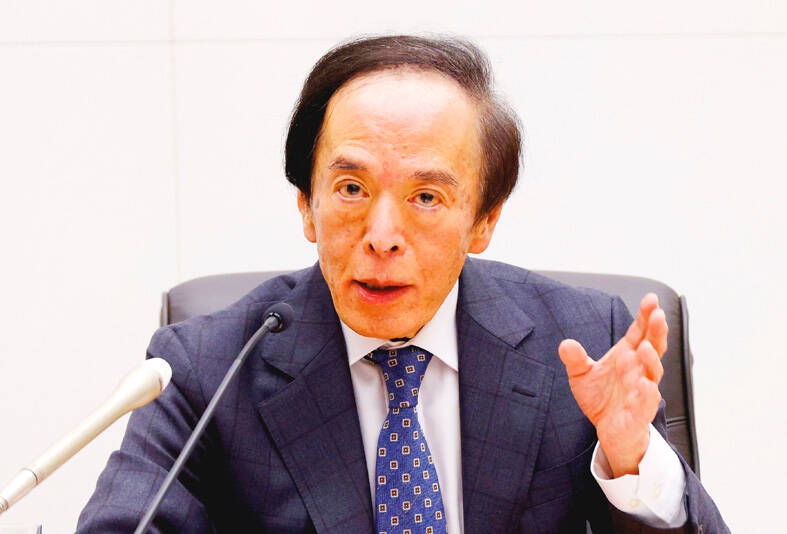The Bank of Japan (BOJ) left its key interest rate unchanged yesterday and warned about the economic outlook amid global uncertainty fueled by US President Donald Trump’s trade war.
BOJ officials began lifting borrowing costs last year after nearly two decades of ultra-loose monetary policies aimed at kickstarting torpid growth in the world’s number four economy.
However, since coming to office in January the Trump administration has embarked on a hardball campaign to rectify what it says are unfair trade imbalances, and imposed levies on multiple trading partners and imports including steel.

Photo: Reuters
The uncertainty unleashed by that has forced central banks around the world to reassess their recent monetary policies.
The BOJ yesterday after a two-day meeting said it would stand pat on its key rate, having lifted it to a 17-year high of around 0.5 percent in January.
“There remain high uncertainties surrounding Japan’s economic activity and prices, including the evolving situation regarding trade,” it said in a statement.
“Tariffs can directly affect the economy through trade — especially production volumes, inflation and prices,” BOJ Governor Kazuo Ueda told reporters.
“On the other hand, tariffs, or even the prospect of tariffs, can affect the mindset or confidence of households and businesses, which could directly impact spending,” he added.
Moody’s Analytics senior economist Stefan Angrick said the BOJ statement “paints a fairly upbeat picture of the economy, which suggests the central bank is looking to tighten monetary policy further.”
However, “with the dust still settling from January’s rate hike... the BOJ wants to gauge the impact of recent policy changes before tightening further,” he wrote in a note.
Separately, Indonesia’s central bank kept its key interest rate unchanged for a second straight month, seeking to safeguard the rupiah after concerns about the economy’s outlook triggered a market selloff this week.
Bank Indonesia kept its benchmark rate at 5.75 percent yesterday, as predicted by most economists in a Bloomberg News survey. The central bank also maintained its economic growth forecast for this year at 4.7 percent to 5.5 percent and kept its inflation target at 1.5 percent to 3.5 percent.
The decision comes a day after a stock market meltdown that was fueled by a combination of domestic factors — from Indonesian President Prabowo Subianto’s economic policies to a worsening fiscal outlook. A key factor was fear that veteran Indonesian Minister of Finance Sri Mulyani Indrawati would resign, a rumor she allayed on Tuesday afternoon.
“Going forward, Bank Indonesia continues to monitor the prospects for inflation and economic growth in terms of considering further room for monetary easing based on rupiah exchange rate movements,” Bank Indonesia Governor Perry Warjiyo said yesterday.
The bank’s decision was consistent with efforts to keep inflation forecasts for this year and next year under control, maintain the stability of the rupiah and support economic growth, he said.
The rupiah — which has lost more than 1 percent against the US dollar over the past month and is the worst performer in Asia — remains manageable and is expected to be stable going forward, he added.
Additional reporting by Bloomberg

SEMICONDUCTORS: The German laser and plasma generator company will expand its local services as its specialized offerings support Taiwan’s semiconductor industries Trumpf SE + Co KG, a global leader in supplying laser technology and plasma generators used in chip production, is expanding its investments in Taiwan in an effort to deeply integrate into the global semiconductor supply chain in the pursuit of growth. The company, headquartered in Ditzingen, Germany, has invested significantly in a newly inaugurated regional technical center for plasma generators in Taoyuan, its latest expansion in Taiwan after being engaged in various industries for more than 25 years. The center, the first of its kind Trumpf built outside Germany, aims to serve customers from Taiwan, Japan, Southeast Asia and South Korea,

POWERING UP: PSUs for AI servers made up about 50% of Delta’s total server PSU revenue during the first three quarters of last year, the company said Power supply and electronic components maker Delta Electronics Inc (台達電) reported record-high revenue of NT$161.61 billion (US$5.11 billion) for last quarter and said it remains positive about this quarter. Last quarter’s figure was up 7.6 percent from the previous quarter and 41.51 percent higher than a year earlier, and largely in line with Yuanta Securities Investment Consulting Co’s (元大投顧) forecast of NT$160 billion. Delta’s annual revenue last year rose 31.76 percent year-on-year to NT$554.89 billion, also a record high for the company. Its strong performance reflected continued demand for high-performance power solutions and advanced liquid-cooling products used in artificial intelligence (AI) data centers,

Gasoline and diesel prices at domestic fuel stations are to fall NT$0.2 per liter this week, down for a second consecutive week, CPC Corp, Taiwan (台灣中油) and Formosa Petrochemical Corp (台塑石化) announced yesterday. Effective today, gasoline prices at CPC and Formosa stations are to drop to NT$26.4, NT$27.9 and NT$29.9 per liter for 92, 95 and 98-octane unleaded gasoline respectively, the companies said in separate statements. The price of premium diesel is to fall to NT$24.8 per liter at CPC stations and NT$24.6 at Formosa pumps, they said. The price adjustments came even as international crude oil prices rose last week, as traders

SIZE MATTERS: TSMC started phasing out 8-inch wafer production last year, while Samsung is more aggressively retiring 8-inch capacity, TrendForce said Chipmakers are expected to raise prices of 8-inch wafers by up to 20 percent this year on concern over supply constraints as major contract chipmakers Taiwan Semiconductor Manufacturing Co (TSMC, 台積電) and Samsung Electronics Co gradually retire less advanced wafer capacity, TrendForce Corp (集邦科技) said yesterday. It is the first significant across-the-board price hike since a global semiconductor correction in 2023, the Taipei-based market researcher said in a report. Global 8-inch wafer capacity slid 0.3 percent year-on-year last year, although 8-inch wafer prices still hovered at relatively stable levels throughout the year, TrendForce said. The downward trend is expected to continue this year,